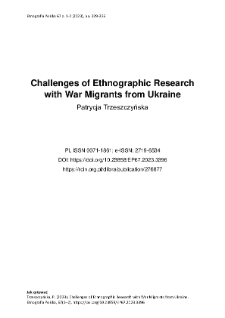- Search in all Repository
- Literature and maps
- Archeology
- Mills database
- Natural sciences
Advanced search
Advanced search
Advanced search
Advanced search
Advanced search

Object
Title: Challenges of Ethnographic Research with War Migrants from Ukraine
Publisher:
Instytut Archeologii i Etnologii Polskiej Akademii Nauk
Place of publishing:
Description:
Type of object:
Abstract:
This short reflection on ethnographic research with forced migrants who arrived in Poland after February 24, 2022, addresses topics that are crucial in designing a research project in cooperation with people who fled from Ukraine. Issues related to research ethics, the situation of difficult research in cooperation with potentially traumatised people, positioned by popular discourses as refugees and victims of the Russian invasion of Ukraine are explored here. In addition, my reflection concerns access to the site, the researcher’s involvement and responsibility, the specificity of the research situation, as well as problems and challenges facing their archiving and representation. I indicate research risks such as revictimisation, lack of psychological tools and burdens of the researcher, and the further life of constructed ethnographic knowledge that is built on the experience of war migrants from Ukraine. This reflection text also includes some practical advice on designing conversations with war migrants from Ukraine. In addition to the indicated challenges of ethnographic research in cooperation with forced migrants from Ukraine, the paper contains an appeal for a radical increase in ethical standards in a situation of war and forced migration.
References:
Allwood, Gil, and Wadia Kursheed 2010, Refugee Women in Britain and France, Manchester University Press, Manchester.
Ghorashi, Halleh 2005, Agents of Change or Passive Victims: The Impact of Welfare States (the Case of the Netherlands) on Refugees, Journal of Refugee Studies, vol. 18, pp. 181–198.
Renkens, José, Els Rommes, and Maria van den Muijsenbergh 2022, Refugees’ Agency: On Resistance, Resilience, and Resources, International Journal of Environmental Research and Public Health, vol. 19, no. 2, p. 806.
Malkki, Liisa H. 1996, Speechless Emissaries: Refugees, Humanitarianism, and Dehistoricization, Cultural Anthropology, vol. 11, pp. 377–404.
Testimonies About the War in Ukraine: How to Conduct Interview-Based Research, https://www.you-tube.com/watch?v=BYswk0T8yUI&ab_channel=Deutsch-UkrainischeHistorischekommission (accessed 15.02.2023).
van den Hoonaard Will C. 2018, The Vulnerability of Vulnerability: Why Social Science Researchers Should Abandon the Doctrine of Vulnerability, [in:] R. Iphofen, M. Tolich (ed,.), The SAGE Handbook of Qualitative Research Ethics, pp. 305–321.
https://udsc.prowly.com/224477-ochrona-miedzynarodowa-w-2022-r-ponad-dwukrotny-wzrost-rozpatrzonych-wnioskow (accessed: 12.09.2023)
Relation:
Volume:
Issue:
Start page:
End page:
Detailed Resource Type:
Format:
Resource Identifier:
oai:rcin.org.pl:240578 ; 0071-1861 ; e-ISSN: 2719-6534 ; doi:10.23858/EP67.2023.3396
Source:
IAiE PAN, call no. P 326 ; IAiE PAN, call no. P 327 ; IAiE PAN, call no. P 325 ; click here to follow the link
Language:
Rights:
Creative Commons Attribution BY 4.0 license
Terms of use:
Copyright-protected material. [CC BY 4.0] May be used within the scope specified in Creative Commons Attribution BY 4.0 license, full text available at: ; -
Digitizing institution:
Institute of Archaeology and Ethnology of the Polish Academy of Sciences
Original in:
Library of the Institute of Archaeology and Ethnology of the Polish Academy of Sciences
Access:
Object collections:
- Digital Repository of Scientific Institutes > Partners' collections > Institute of Archeology and Ethnology PAS
- Digital Repository of Scientific Institutes > Partners' collections > Institute of Archeology and Ethnology PAS > Institute Publications
- Digital Repository of Scientific Institutes > Partners' collections > Institute of Archeology and Ethnology PAS > Institute Publications > Current Journals
- Digital Repository of Scientific Institutes > Literature > Journals/Articles
- Digital Repository of Scientific Institutes > Partners' collections > Institute of Archeology and Ethnology PAS > Institute Publications > Current Journals > Etnografia Polska
Last modified:
Feb 26, 2024
In our library since:
Feb 26, 2024
Number of object content downloads / hits:
61
All available object's versions:
https://rcin.org.pl./publication/276877
Show description in RDF format:
Show description in RDFa format:
Show description in OAI-PMH format:
| Edition name | Date |
|---|---|
| Trzeszczyńska, Patrycja, 2023, Challenges of Ethnographic Research with War Migrants from Ukraine | Feb 26, 2024 |
Objects Similar
Wanner, Catherine King-Savic, Sandra Tosic, Jelena Tarkhanova, Oleksandra
Rzepkowska, Aleksandra
Pysarenko, Svitlana
Boćkowski, Daniel (1968– )
Ivanov, Tatʹâna
Koziebrodzki, Józef.

 INSTYTUT ARCHEOLOGII I ETNOLOGII POLSKIEJ AKADEMII NAUK
INSTYTUT ARCHEOLOGII I ETNOLOGII POLSKIEJ AKADEMII NAUK
 INSTYTUT BADAŃ LITERACKICH POLSKIEJ AKADEMII NAUK
INSTYTUT BADAŃ LITERACKICH POLSKIEJ AKADEMII NAUK
 INSTYTUT BADAWCZY LEŚNICTWA
INSTYTUT BADAWCZY LEŚNICTWA
 INSTYTUT BIOLOGII DOŚWIADCZALNEJ IM. MARCELEGO NENCKIEGO POLSKIEJ AKADEMII NAUK
INSTYTUT BIOLOGII DOŚWIADCZALNEJ IM. MARCELEGO NENCKIEGO POLSKIEJ AKADEMII NAUK
 INSTYTUT BIOLOGII SSAKÓW POLSKIEJ AKADEMII NAUK
INSTYTUT BIOLOGII SSAKÓW POLSKIEJ AKADEMII NAUK
 INSTYTUT CHEMII FIZYCZNEJ PAN
INSTYTUT CHEMII FIZYCZNEJ PAN
 INSTYTUT CHEMII ORGANICZNEJ PAN
INSTYTUT CHEMII ORGANICZNEJ PAN
 INSTYTUT FILOZOFII I SOCJOLOGII PAN
INSTYTUT FILOZOFII I SOCJOLOGII PAN
 INSTYTUT GEOGRAFII I PRZESTRZENNEGO ZAGOSPODAROWANIA PAN
INSTYTUT GEOGRAFII I PRZESTRZENNEGO ZAGOSPODAROWANIA PAN
 INSTYTUT HISTORII im. TADEUSZA MANTEUFFLA POLSKIEJ AKADEMII NAUK
INSTYTUT HISTORII im. TADEUSZA MANTEUFFLA POLSKIEJ AKADEMII NAUK
 INSTYTUT JĘZYKA POLSKIEGO POLSKIEJ AKADEMII NAUK
INSTYTUT JĘZYKA POLSKIEGO POLSKIEJ AKADEMII NAUK
 INSTYTUT MATEMATYCZNY PAN
INSTYTUT MATEMATYCZNY PAN
 INSTYTUT MEDYCYNY DOŚWIADCZALNEJ I KLINICZNEJ IM.MIROSŁAWA MOSSAKOWSKIEGO POLSKIEJ AKADEMII NAUK
INSTYTUT MEDYCYNY DOŚWIADCZALNEJ I KLINICZNEJ IM.MIROSŁAWA MOSSAKOWSKIEGO POLSKIEJ AKADEMII NAUK
 INSTYTUT PODSTAWOWYCH PROBLEMÓW TECHNIKI PAN
INSTYTUT PODSTAWOWYCH PROBLEMÓW TECHNIKI PAN
 INSTYTUT SLAWISTYKI PAN
INSTYTUT SLAWISTYKI PAN
 SIEĆ BADAWCZA ŁUKASIEWICZ - INSTYTUT TECHNOLOGII MATERIAŁÓW ELEKTRONICZNYCH
SIEĆ BADAWCZA ŁUKASIEWICZ - INSTYTUT TECHNOLOGII MATERIAŁÓW ELEKTRONICZNYCH
 MUZEUM I INSTYTUT ZOOLOGII POLSKIEJ AKADEMII NAUK
MUZEUM I INSTYTUT ZOOLOGII POLSKIEJ AKADEMII NAUK
 INSTYTUT BADAŃ SYSTEMOWYCH PAN
INSTYTUT BADAŃ SYSTEMOWYCH PAN
 INSTYTUT BOTANIKI IM. WŁADYSŁAWA SZAFERA POLSKIEJ AKADEMII NAUK
INSTYTUT BOTANIKI IM. WŁADYSŁAWA SZAFERA POLSKIEJ AKADEMII NAUK


































